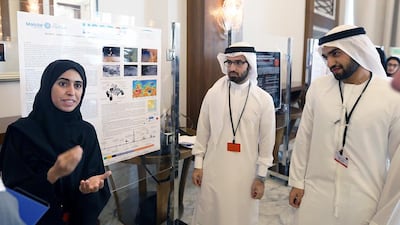DUBAI // Aiming for Mars is a positive step for the UAE, despite risks in sending a probe to the Red Planet, academics and explorers were told on Monday.
Engineers, professors and a former Nasa astronaut shared their views on the goal at the second annual Emirates Mars Mission Workshop of the Mohammed bin Rashid Space Centre.
“You are doing something I have always dreamt of,” said Marsha Ivins, who spent more than 1,300 hours in space as a Nasa astronaut and a veteran of five space shuttle flights.
After describing how to eat, exercise, sleep and use the toilet in space, Ms Ivins said the best way to motivate people was by example.
“When you get people to do something that is hard and hasn’t been done before, like going to Mars, that inspires everyone,” she said.
Ms Ivins said her generation was inspired by images of American missions into space and to the Moon in the 1960s, and images from the UAE’s Hope probe in 2021 could similarly fire the imagination of Emiratis.
“When we saw those images in the US, it caused an infusion of national pride. Seeing a picture of Mars taken by UAE’s probe, which the whole world would get to see, will be something to be very proud of,” she said.
More than 100 students, graduates and professors attended the workshop, which featured presentations on Mars that focused on the reasons behind the Hope mission, the study of the Martian atmosphere, and how science is depicted in science fiction.
Prof Bruce Jakosky, who studied the Red Planet for more than 40 years and is a member of the Emirates Mars Mission science team, said choosing Mars as the target for the UAE’s first mission was bold.
“Mars missions are inherently difficult and for some reason have a higher failure rate than other spacecraft missions,” said Prof Jakosky, the principal investigator for Maven, a Nasa mission which launched a probe now orbiting Mars. He is also an associate director of the Laboratory for Atmospheric and Space Physics at the University of Colorado.
“I am impressed by the UAE for picking a difficult mission rather than taking the easiest thing to do.”
It is crucial to manage risks ahead of the Hope probe’s scheduled launch in July 2020, so that it can complete its seven-month journey in time for the UAE’s 50th anniversary in 2021, according to Omran Sharaf, project manager of Emirates Mars Mission.
“We have a deputy dedicated to managing and mitigating risks and a risk board that meets every two weeks,” he said.
Taking chances is the only way to achieve progress while meeting one of the mission’s principal goals – inspiring youth in the UAE and the region.
“It is not only about the science but also about changing the region’s culture toward science,” said Mr Sharaf.
“To do that, you need big goals – a bold mission.”
By reaching for Mars, the UAE is sending a message to all Arab youth.
“If a country like UAE is able to reach Mars in less than 50 years [since its formation], then you can do much more,” Mr Sharaf said.
The workshop catered to participants with and without scientific backgrounds, offering both in-depth and simplified talks.
tsubaihi@thenational.ae

